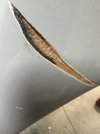Considering partnering with someone on a plane he already owns. Is a PA28-140 a 1968 Cherokee 140. He said the last annual in October was almost $30K . It's IFR certified and he values it around $70K.
I looked into pre-purchase inspections and it seems like they cost about 80% of an annual and look at similar things.
So my thinking is, if I'm basically paying for an annual anyways why not just do an annual? My concern is he might not want to do it because if something comes up and I decide not to buy the airplane now he is stuck with a maintenance bill that might have been able to wait otherwise. But if the annual is done before it is due then would the repairs be required? Thanks!
Edit Looked at the paperwork for the last annual
There are a lot of line items obviously but the ones that stand out are
Aileron Rigging, was not hitting full stops
Reskin Rudder & both flaps upper
Paint (presumably for the reskins, not a full paint job)
Muffler Replaced
Alternator Replaced
Carb heat shroud
Handbrake reseal
Hourly rate $96
I looked into pre-purchase inspections and it seems like they cost about 80% of an annual and look at similar things.
So my thinking is, if I'm basically paying for an annual anyways why not just do an annual? My concern is he might not want to do it because if something comes up and I decide not to buy the airplane now he is stuck with a maintenance bill that might have been able to wait otherwise. But if the annual is done before it is due then would the repairs be required? Thanks!
Edit Looked at the paperwork for the last annual
There are a lot of line items obviously but the ones that stand out are
Aileron Rigging, was not hitting full stops
Reskin Rudder & both flaps upper
Paint (presumably for the reskins, not a full paint job)
Muffler Replaced
Alternator Replaced
Carb heat shroud
Handbrake reseal
Hourly rate $96
Last edited:

